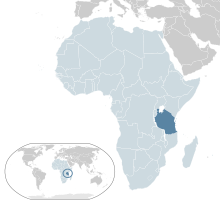LGBTQ rights in United Republic of Tanzania | |
|---|---|
 Tanzania | |
| Status | Illegal since 1864 in Zanzibar; and since 1899 on mainland (as German East Africa)[1] |
| Penalty | Up to life imprisonment with fines.[2][3] |
| Gender identity | No |
| Military | No |
| Discrimination protections | No |
| Family rights | |
| Recognition of relationships | No recognition of same-sex unions |
| Adoption | No |
Lesbian, gay, bisexual, and transgender (LGBT) people in Tanzania face severe challenges not experienced by non-LGBTQ residents.[4][5] Homosexuality in Tanzania is a socially taboo topic, and same-sex sexual acts (even in private and consensual) are criminal offences, punishable with life imprisonment. The law also criminalises heterosexuals who engage in oral sex and anal intercourse.
According to the 2007 Pew Global Attitudes Project, 95 percent[a] of Tanzanian residents believed that homosexuality is a way of life that society should not accept, which was the seventh-highest rate of non-acceptance in the 45 countries surveyed.[6] Meanwhile, an Afrobarometer 2020 poll indicated that only 10 percent of Tanzanians would be tolerant of someone with a different sexual orientation. This was among the lowest in Africa, but higher than the 2007 poll.[7]
In recent years, Tanzania has become particularly hostile to LGBT people. In October 2017, it deported staff of several HIV/AIDS groups on the basis of "promoting homosexuality". Tanzania has a high HIV/AIDS rate and reportedly one million people are infected.[3] The Government has increasingly resorted to homophobic rhetoric, alleging that homosexuality is "un-African". In 2018, a so-called "witch hunt" was declared against gay people in Dar es Salaam, where gay men were forced to endure anal examinations and torture.[3] Tanzania has a poor human rights record. Government respect for freedom of speech and freedom of assembly is declining.
Despite this, there have been several Tanzanian human rights campaigners, activists, lawyers and feminists like Maria Sarungi, Fatma Karume, Mwanahamisi Singano, Carol Ndosi, Zara Kay, Khalifa Said, Goodluck Haule and many others who have openly supported LGBT rights whilst openly opposing state-sanctioned homophobia and dangerous rhetoric from government officials who have called for further persecution of these marginalized groups.[citation needed] Promoters of anti-LGBT campaigns have included the former president Magufuli, Paul Makonda, Ally Hapi, and Hamisi Kigwangalla.
- ^ "Where is it illegal to be gay?". 10 February 2014. Archived from the original on 16 November 2017. Retrieved 20 June 2018 – via www.bbc.com.
- ^ Bureau of Democracy, Human Rights and Labor 2013, p. 33.
- ^ a b c Cite error: The named reference
hrw mixedwas invoked but never defined (see the help page). - ^ "Tanzania". Human Dignity Trust. Retrieved 25 August 2023.
- ^ "Foreign travel advice - Tanzania". Gov.uk. Retrieved 16 September 2023.
- ^ Pew Global Attitudes Project (PDF), pp. 35, 84, 117, archived from the original (PDF) on 14 February 2010, retrieved 3 December 2009
- ^ "Tolerance in Africa" (PDF). Archived (PDF) from the original on 7 July 2021. Retrieved 17 November 2022.
Cite error: There are <ref group=lower-alpha> tags or {{efn}} templates on this page, but the references will not show without a {{reflist|group=lower-alpha}} template or {{notelist}} template (see the help page).